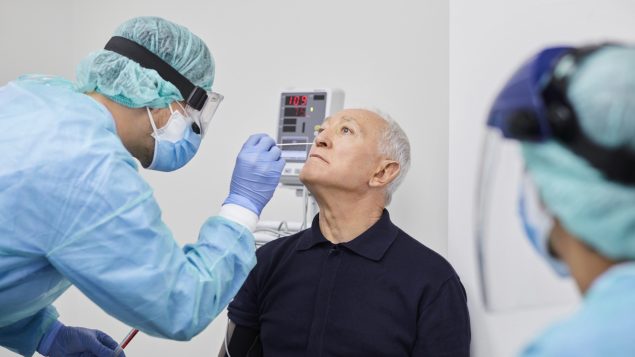
Research indicates that saliva testing for COVID-19 is as good as nasopharyngeal (nasal) swabbing, but it is cheaper and easier to do. Studies from the Research Institute of the McGill University Health Centre (RI-MUHC) yield findings that could influence testing strategies in Canada and around the world.
Previous studies of saliva tests showed mixed results. But researchers did two systematic reviews of previous studies comparing thousands samples of the two types of test and found the sensitivity of the tests was “virtually identical.” They also estimated that using saliva tests would save about $808,000 per 100,000 people sampled. It would also free up healthcare professionals needed to perform nasal swabs and save on the personal protective equipment and collection materials they need for those tests.

Besides being unpleasant to experience, nasal swab tests are more expensive and require health professionals to administer them. (iStock)
Saliva tests reduce risk of exposure for health professionals
“Nasopharyngeal swabs are very sensitive, but they are time-consuming and require a trained health professional to administer. Saliva-based samples are as sensitive and much cheaper, while having the advantage of being self-collected. This removes the need for a trained health professional and reduces exposure risk,” study co-author Jonathon Campbell, a Postdoctoral Fellow at the RI-MUHC. “Adopting saliva-based sampling could free up much-needed health professionals for clinical care and vaccine administration, while maintaining the high level of testing necessary to keep up with the COVID-19 pandemic.”
Over 75,000 tests are being done each day in Canada, so researchers suggest that switching from nasal swabs to saliva sampling would save half a million dollars a day.
One of the RI-MUHC studies was published in the journal JAMA Internal Medicine. The other was published in the Annals of Internal Medicine.
Nasal swab tests may be hard to do on certain people
The researchers note that because nasal swab tests must be done by trained healthcare professionals, that limits testing capacity and the ability to deploy testing programs in the community. They are also hard to do on certain people like children and quarantined individuals. The authors conclude that it is “incredibly important to validate this [saliva] sampling technique for possible deployment in countries or communities with continually high case rates and especially those with developing healthcare systems and less access to specialized care.


